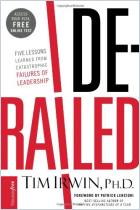Be sure you’re not using motivational tactics that could upset and demotivate people instead of bolstering them. Leaders should help their staff members become better employees and better people, not berate and threaten them. You can enhance your ability to bring about change in others by acknowledging and encouraging them instead of criticizing them. Tim Irwin's compassionate, wise manual explains how to head employees and yourself in a positive direction. His guidance will be useful to senior executives and anyone in a position to affirm other people.His clarity makes his insights eminently readable. getAbstract recommends his guidance to senior executives and anyone in a position to affirm and motivate other people.
Getting Engaged
Surveys reveal that close to 70% of employees feel disengaged from their work. Close to a third do as little work as they can. And many managers aren’t helping. Most often, those in command berate disengaged or underperforming employees and threaten them. Instead, managers should embrace leadership tactics that help workers become better employees and better people.
To enhance your ability to bring about change in others, acknowledge and encourage them instead of criticizing them. Taking punitive or negative measures to motivate your employees may have exactly the opposite effect from what you intend. In fact, advances in science show that many conventional management practices lack a sound foundation.
“I’m Going to Hold His Feet to the Fire”
Many senior executives use such belligerent phrases, evocative of ancient torture, to describe how they will get employees to perform. You may have heard some of these remarks, which are clear signs of “Macho Management.” This approach rests on the belief that you can use your toughness to make other people do something they don’t want to do. Proponents ...
Tim Irwin is a licensed psychologist and a University of Georgia psychology professor. A frequent speaker, he has served on the management team of a Fortune 500 company and has consulted with large corporations worldwide for more than 25 years.

















Comment on this summary or Comenzar discusión
Extraordinary Influence
effectively encapsulates the core themes and actionable insights presented in the book. It highlights the essential qualities that contribute to effective leadership, emphasizing the importance of influence over authority. The focus on trust as the foundation of influence is particularly noteworthy, as it underscores the relational aspect of leadership that is often overlooked in traditional discussions about power dynamics.
The actionable insights provided in the summary are practical and relevant for leaders at all levels. For instance, the emphasis on active listening and providing constructive feedback aligns with contemporary leadership practices that prioritize emotional intelligence and open communication. By advocating for empowerment and autonomy, Irwin's approach resonates with modern organizational trends that value employee engagement and ownership.
Moreover, the call for leaders to model the behaviors they wish to see in their teams reinforces the idea that leadership is not just about directing others but also about embodying the values and standards expected within the organization. This aspect of leading by example is crucial for fostering a culture of accountability and excellence. Overall, the summary presents a well-rounded view of Irwin's work, making it accessible and applicable for readers seeking to enhance their leadership skills. It serves as a valuable resource for individuals looking to cultivate extraordinary influence and create a positive impact within their organizations.